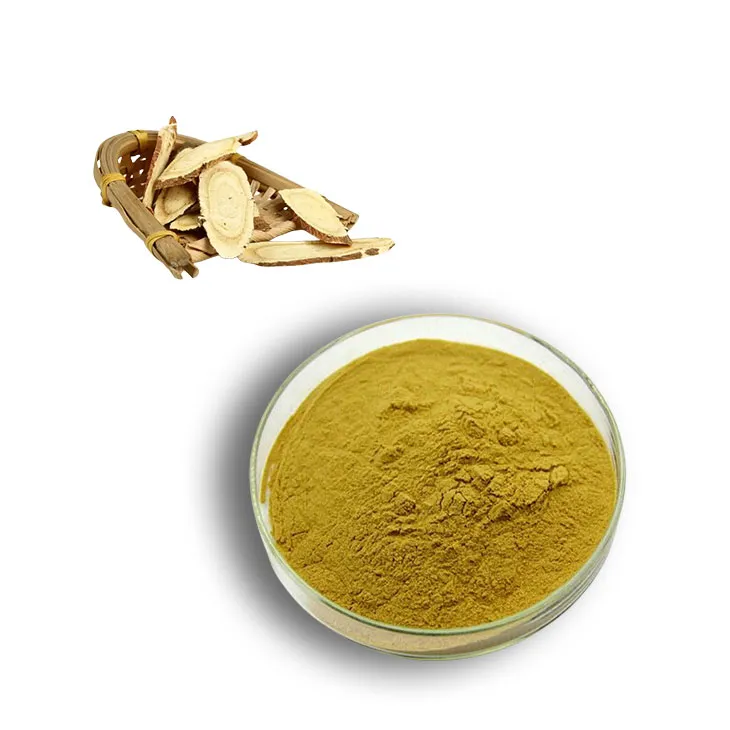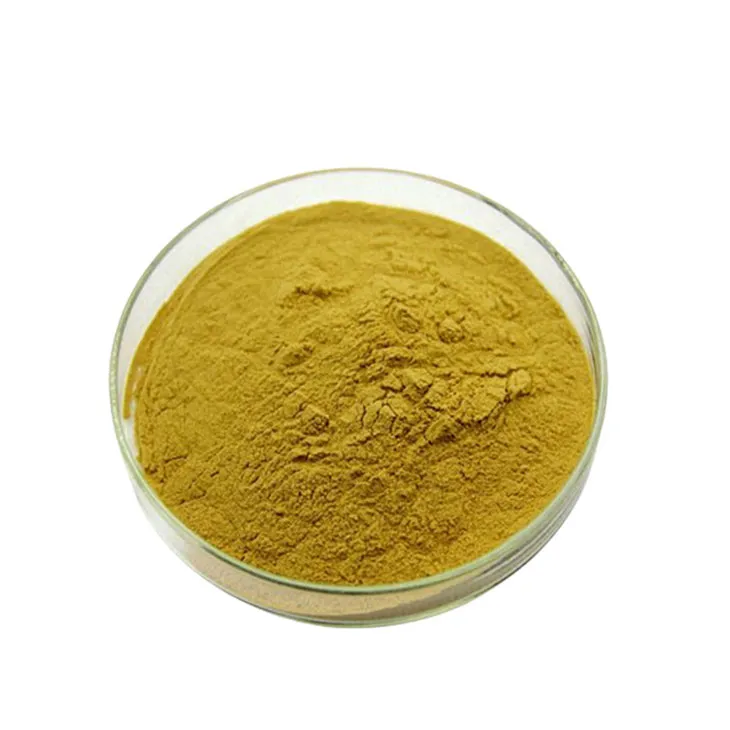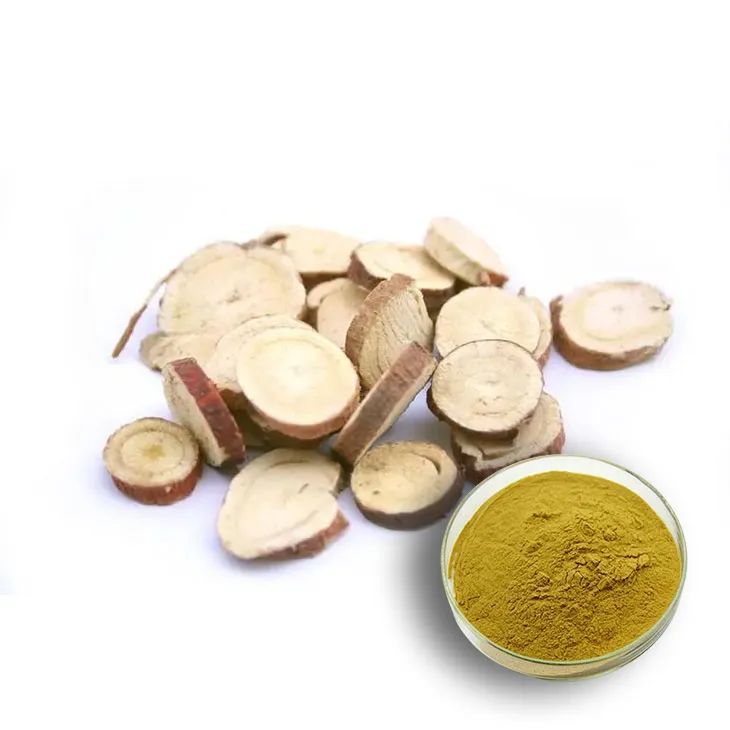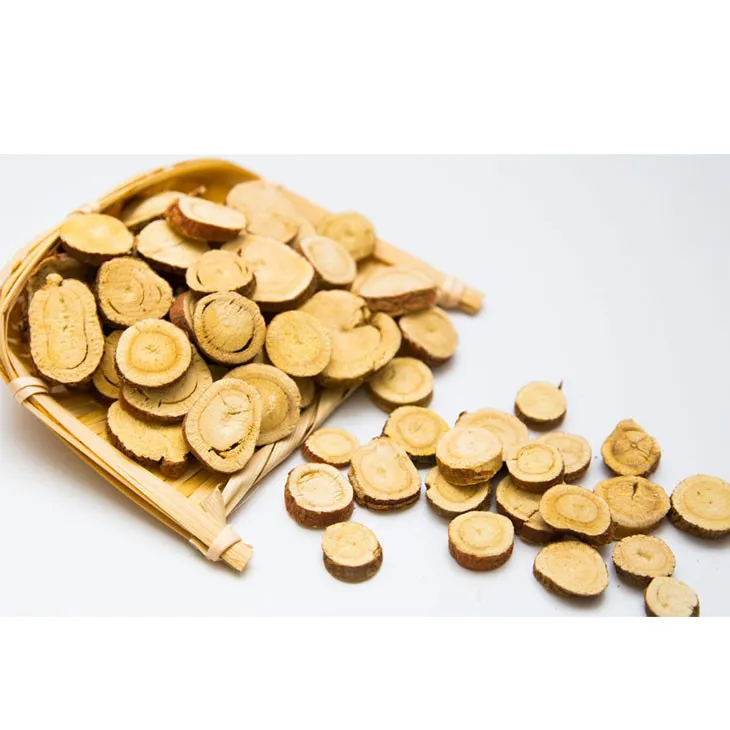- 0086-571-85302990
- sales@greenskybio.com
Use licorice root extract powder? Make sure you source from sustainable suppliers!
2024-12-16

1. Introduction to Licorice Root Extract Powder
Licorice Root Extract Powder has gained significant popularity in various sectors in recent years. It is derived from the licorice plant, which has a long history of use in traditional medicine, particularly in Asian and Middle - Eastern cultures. In traditional medicine, licorice root was used to treat a variety of ailments, including digestive problems, coughs, and skin conditions.
Today, the applications of Licorice Root Extract Powder have expanded far beyond traditional medicine. It is widely used in the food and beverage industry as a natural sweetener. Licorice root extract powder has a sweet taste that is much sweeter than sucrose, but with a unique flavor profile that adds depth and complexity to food and beverage products. It can be found in candies, chewing gums, herbal teas, and even some alcoholic beverages.
The cosmetics and skincare industries also have a great interest in licorice root extract powder. It is known for its anti - inflammatory and skin - brightening properties. Licorice root extract can be used in creams, lotions, and serums to soothe irritated skin, reduce redness, and even out skin tone. Some products claim that it can also help with anti - aging, by promoting collagen production and protecting the skin from environmental damage.

2. The Importance of Sustainable Suppliers
In the context of licorice root extract powder, sustainable suppliers play a crucial role. With the increasing demand for this product, it is essential to ensure that the supply chain is sustainable, both environmentally and socially.
2.1 Environmental Benefits
Sustainable suppliers use methods that are friendly to the environment. One of the main concerns in the production of licorice root extract powder is the impact on the natural habitats of the licorice plant. Licorice plants are native to certain regions, and over - harvesting can lead to the degradation of these habitats.
Sustainable suppliers implement measures to reduce the carbon footprint associated with the production and transportation of licorice root extract powder. They may use renewable energy sources in their processing facilities, or optimize their transportation routes to minimize fuel consumption. For example, some suppliers are using solar - powered drying techniques for the licorice roots, which not only reduces their reliance on non - renewable energy but also helps in preserving the quality of the extract.
Another aspect is water conservation. The cultivation and processing of licorice roots require water. Sustainable suppliers are more likely to use efficient irrigation systems and water recycling methods in their operations, ensuring that water resources are not wasted.
2.2 Social Benefits
Sustainable suppliers also contribute to the well - being of local communities. In many regions where licorice is grown, the local farmers and workers depend on the licorice industry for their livelihoods.
Sustainable suppliers ensure fair wages and working conditions for these workers. They may also invest in community development projects, such as building schools or providing healthcare facilities in the local areas. This helps in creating a more stable and prosperous community around the licorice root extract powder production.
Furthermore, sustainable suppliers are more likely to follow ethical sourcing practices. This means that they ensure that the licorice roots are sourced legally, without any involvement in illegal harvesting or exploitation of labor.

3. How Sustainable Suppliers Contribute to Sustainable Development Goals
Sustainable suppliers of licorice root extract powder play an important part in achieving the global sustainable development goals.
3.1 Goal 12: Responsible Consumption and Production
By implementing sustainable practices in the production and supply of licorice root extract powder, suppliers are contributing to responsible consumption and production. They are reducing waste, using resources more efficiently, and promoting the use of sustainable products in the market.
For example, some suppliers are using packaging materials that are biodegradable or recyclable. This not only reduces the environmental impact of the product but also sets an example for other industries in terms of responsible packaging.
3.2 Goal 13: Climate Action
As mentioned earlier, sustainable suppliers are taking steps to reduce their carbon footprint. This directly contributes to the global effort of combating climate change. By using renewable energy sources and optimizing transportation, they are reducing greenhouse gas emissions associated with the licorice root extract powder supply chain.
Some suppliers are also involved in carbon sequestration projects in the areas where licorice is grown. These projects help in absorbing carbon dioxide from the atmosphere, further mitigating the impact of climate change.
3.3 Goal 15: Life on Land
Protecting the habitats of licorice plants is an important aspect of sustainable supply. Licorice plants are part of the local ecosystems, and their conservation is crucial for maintaining biodiversity. Sustainable suppliers work towards sustainable harvesting methods that ensure the long - term survival of the licorice plants and the associated wildlife.
They may also be involved in reforestation or habitat restoration projects in the areas where licorice is cultivated. This helps in creating a more sustainable and resilient ecosystem.

4. Tips for Identifying Sustainable Suppliers
For consumers and businesses interested in using licorice root extract powder from sustainable sources, here are some tips for identifying sustainable suppliers:
- Certifications: Look for suppliers that have relevant certifications. For example, organic certifications can indicate that the licorice roots are grown without the use of synthetic pesticides and fertilizers. Fair trade certifications can show that the suppliers follow ethical sourcing and fair labor practices.
- Transparency: A good sustainable supplier will be transparent about their sourcing and production processes. They should be able to provide information about where the licorice roots are sourced, how they are processed, and what measures they take to ensure sustainability.
- Supply Chain Traceability: Suppliers with a strong supply chain traceability system can track the licorice roots from the farm to the final product. This helps in ensuring that the product is sourced sustainably and that there are no illegal or unethical practices in the supply chain.
- Environmental and Social Policies: Check if the supplier has clear environmental and social policies. These policies should cover aspects such as carbon footprint reduction, water conservation, fair labor practices, and community development.

5. Collaborating with Sustainable Suppliers
Once you have identified sustainable suppliers of licorice root extract powder, the next step is to collaborate with them effectively.
- Establish Clear Expectations: Clearly communicate your requirements in terms of sustainability, quality, and price. Make sure that both parties are on the same page regarding these aspects.
- Build Long - Term Relationships: Long - term relationships are beneficial for both suppliers and buyers. They allow for better planning, investment in sustainable practices, and more stable supply chains.
- Share Best Practices: Both the supplier and the buyer can learn from each other's best practices. For example, the buyer can share market trends and consumer demands related to sustainability, while the supplier can share their experiences in implementing sustainable production methods.
- Joint Projects: Consider engaging in joint projects with the supplier. This could include projects related to research and development of new products using licorice root extract powder, or initiatives to further improve the sustainability of the supply chain.
6. Conclusion
Licorice root extract powder has a wide range of applications in various industries. However, as the demand for this product grows, it is crucial to ensure that it is sourced from sustainable suppliers.
Sustainable suppliers not only contribute to environmental and social well - being but also play an important role in achieving the global sustainable development goals. By following the tips for identifying and collaborating with sustainable suppliers, consumers and businesses can ensure that they are using licorice root extract powder in a sustainable and responsible manner.
FAQ:
What are the main uses of licorice root extract powder?
Licorice root extract powder has a wide range of uses. In the food industry, it can be used as a flavor enhancer, adding a unique sweet and pleasant taste to various products. In the pharmaceutical field, it has certain medicinal properties, such as being used in some traditional medicine for soothing coughs and reducing inflammation. In the cosmetic industry, it is often added to skincare products for its potential antioxidant and skin - soothing effects.
Why is it important to source licorice root extract powder from sustainable suppliers?
It is crucial to source from sustainable suppliers for several reasons. Firstly, sustainable suppliers use methods that are environmentally friendly. They help in reducing the carbon footprint associated with the extraction and production processes. Secondly, they ensure the long - term survival of licorice plants by safeguarding their habitats. This is essential as over - exploitation of licorice plants can lead to their depletion. Moreover, sustainable suppliers often follow ethical business practices, which can also contribute to the overall well - being of local communities involved in the supply chain.
How can consumers identify sustainable suppliers of licorice root extract powder?
Consumers can identify sustainable suppliers in several ways. One way is to look for certifications. For example, some suppliers may have environmental certifications that indicate their commitment to sustainable practices. Another way is to research the supplier's reputation. This can be done by reading reviews from other customers or industry experts. Additionally, consumers can inquire about the supplier's sourcing methods, such as whether they are involved in any reforestation efforts or if they follow sustainable harvesting practices for licorice plants.
What are the benefits of sustainable sourcing for the licorice root extract powder business?
For the licorice root extract powder business, sustainable sourcing has multiple benefits. It can enhance the brand image as more and more consumers are becoming environmentally conscious and prefer products sourced sustainably. It can also lead to long - term cost savings as sustainable practices often involve efficient use of resources. Moreover, sustainable sourcing can help in building stronger relationships with suppliers and other stakeholders, which can contribute to the overall stability and growth of the business.
How do sustainable suppliers contribute to reducing the carbon footprint in the licorice root extract powder supply chain?
Sustainable suppliers contribute to reducing the carbon footprint in various ways. They may use energy - efficient production methods, such as using renewable energy sources for processing licorice root extract powder. They can also optimize their transportation logistics to reduce emissions, for example, by choosing more fuel - efficient vehicles or consolidating shipments. Additionally, sustainable suppliers may implement waste - reduction strategies, which can further reduce the environmental impact and carbon emissions associated with the supply chain.
Related literature
- Sustainable Sourcing of Medicinal Plants: The Case of Licorice"
- "Environmental Impact of Licorice Root Extract Production and the Role of Sustainable Suppliers"
- "Sourcing Licorice Root Extract Powder Responsibly: A Guide for Consumers and Businesses"
- ▶ Hesperidin
- ▶ Citrus Bioflavonoids
- ▶ Plant Extract
- ▶ lycopene
- ▶ Diosmin
- ▶ Grape seed extract
- ▶ Sea buckthorn Juice Powder
- ▶ Fruit Juice Powder
- ▶ Hops Extract
- ▶ Artichoke Extract
- ▶ Mushroom extract
- ▶ Astaxanthin
- ▶ Green Tea Extract
- ▶ Curcumin
- ▶ Horse Chestnut Extract
- ▶ Other Product
- ▶ Boswellia Serrata Extract
- ▶ Resveratrol
- ▶ Marigold Extract
- ▶ Grape Leaf Extract
- ▶ New Product
- ▶ Aminolevulinic acid
- ▶ Cranberry Extract
- ▶ Red Yeast Rice
- ▶ Red Wine Extract
-
Coix Seed Extract
2024-12-16
-
Bilberry Extract
2024-12-16
-
Golden Seal Extract
2024-12-16
-
Red Vine Extract
2024-12-16
-
Panax Ginseng Leaf Extract
2024-12-16
-
Avocado Extract Powder
2024-12-16
-
Citrus Aurantium Extract
2024-12-16
-
Mulberry Extract
2024-12-16
-
Kidney Bean Extract
2024-12-16
-
Green coffee bean Extract
2024-12-16





















